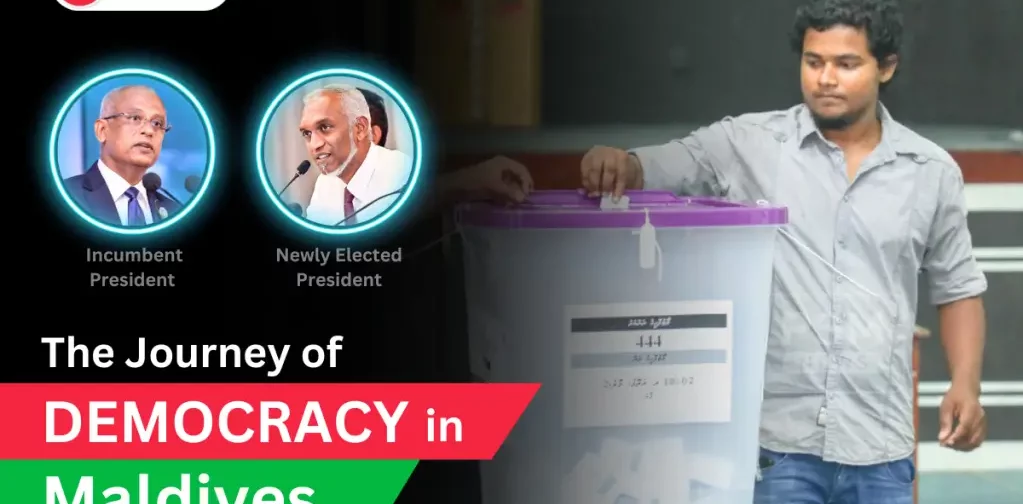
- Home
- About
- Knowledge Center
- Legislative Landscape
- Resources
- #TOGETHERFORBHARA
In a recent chapter of Maldives history, the opposing party won the presidential election, reshaping the nation’s leadership. The election’s impact reached far, influencing the ongoing India-China conflict. To comprehend the Maldives, we must explore its democratic journey, marked by resilience and transformation.
Archipelago of the Maldives in the heart of the Indian Ocean, was a paradise on Earth because of its turquoise waters, coral reefs, and pristine beaches. But beneath the picturesque Maldives lay a complex and evolving story of democracy, a journey that would ultimately transform the nation. Maldives is not only known for its breathtaking natural beauty but also for its remarkable democratic journey.
Once an ancient monarchy, the Maldives embarked on a transformative journey. But in the early 20th century, the British protectorate draped over these paradise islands. In 1965, the Maldives unfurled its independent flag. Hope blossomed, but it was swiftly overshadowed. President Maumoon Abdul Gayoom ascended to power and remained unchallenged for an astonishing 30-year reign. His rule was marked by authoritarianism, casting a shadow on the nation’s democratic aspirations. The people of the Maldives wanted freedom and a better future, and this desire continued for several years.
In the late 20th century, the Maldives saw the emergence of the pro-democracy movement, advocating for political reforms and democratic institutions. In 2004, the Indian Ocean tsunami also brought international attention, highlighting the need for better governance.
Key Milestones in its Journey to Democracy:
In 2008, the Maldives held its first multiparty presidential elections, electing Mohamed Nasheed, a former political prisoner and pro-democracy advocate, as President. A new constitution was adopted in the same year, establishing a presidential system and expanding civil liberties. These steps set the Maldives on a historic path toward democracy, reflecting the aspirations of its people for a more open and inclusive future.
However, the journey to democracy in the Maldives was far from smooth, marked by a series of daunting challenges.
In 2012, resignation of President Nasheed, amid political chaos, with allegations of coercion, plunged the nation into uncertainty and instability.
In 2013, Abdulla Yameen won the presidential elections, but his presidency was marked by political divisions, human rights abuse, and economic challenges.
In 2018, the Maldives made a positive shift, consolidating its democratic foundations. The victory of Ibrahim Mohamed Solih represented a peaceful transfer of power and a renewed dedication to democratic principles and human rights. Under the leadership of Solih, the Maldives undertook democratic reforms, mended international relations, and fostered reconciliation, displaying resilience in upholding democratic ideals for a brighter future.
In a remarkable twist in 2023, Mohamed Muizzu, the main opposition candidate hailing from the People’s National Congress and serving as the Mayor of Male, secured an unexpected victory with 54% of the vote. This surprising turn of events saw him surpass the incumbent President Ibrahim Mohamed Solih. He is set to be sworn in as the President on November 17, 2023.
Maldives’ Electoral System
The Maldives has a presidential system of government, with the president serving as both the head of state and central government. Presidential elections are held every five years, with a limit of two terms per president as per the constitution. To win, a candidate must receive more than 50% of the valid votes. If no candidate achieves this majority, a runoff election between the top two candidates takes place. The official results of the presidential elections are declared by the Election Commission and published in the government gazette within seven days of the voting.
The Freedom in the World 2023 report assesses the state of freedom and democracy in various countries across the globe. In the case of the Maldives, it has been categorized as “Partly Free,” indicating a mixed status concerning political rights and civil liberties. The nation received a score of 41 out of 100, with a breakdown of 19 out of 40 for political rights and 22 out of 60 for civil liberties1.
This implies that while there may be some degree of political participation and representation, there are still notable limitations in this regard. Additionally, the assessment suggests that the protection of individual freedoms, human rights, and civil liberties may face challenges within the Maldivian context. The scores in both categories highlight areas that may require attention and improvement to further enhance the nation’s democratic landscape.
To sum up, the journey of the Maldives democracy mirrors the global quest for freedom and self-rule. Despite hurdles and setbacks, the nation dedicated to democratic ideals stood strong. As it forges ahead, building robust democratic institutions, it inspires the world. This is an exemplification of how even the tiniest nations can find their way to democracy and justice. Their story highlights the power of ordinary citizens and global unity in upholding democracy and human rights.
